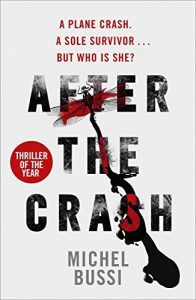Does it matter if you guess the ending?
 Joan Smith thought After the Crash was ‘one of the most remarkable books I’ve read in a long time’, Maxim Jakubowski called it ‘a compulsive page-turner’ and Barry Forshaw said ‘Michel Bussi knows exactly how to keep the reader turning page after page.’ So I was expecting great things, and maybe that was the part of the problem. I did read it compulsively – but only until about half way through, when I ran out of steam and found I couldn’t – or rather didn’t want to – suspend my disbelief any longer. Yes, it’s a brilliant premise. A baby survives a plane crash in which everyone else dies and two families fight over which of them she belongs to. I won’t say exactly when I guessed the answer to this conundrum and the final twist in a very convoluted plot, because that might constitute a spoiler, but it was pretty early on. I hope I wasn’t going to be right, but I was.
Joan Smith thought After the Crash was ‘one of the most remarkable books I’ve read in a long time’, Maxim Jakubowski called it ‘a compulsive page-turner’ and Barry Forshaw said ‘Michel Bussi knows exactly how to keep the reader turning page after page.’ So I was expecting great things, and maybe that was the part of the problem. I did read it compulsively – but only until about half way through, when I ran out of steam and found I couldn’t – or rather didn’t want to – suspend my disbelief any longer. Yes, it’s a brilliant premise. A baby survives a plane crash in which everyone else dies and two families fight over which of them she belongs to. I won’t say exactly when I guessed the answer to this conundrum and the final twist in a very convoluted plot, because that might constitute a spoiler, but it was pretty early on. I hope I wasn’t going to be right, but I was.
This got me thinking about the challenges of writing for a crime fiction readership, which includes of course other crime writers. Like many other readers (and writers) I must have read thousands of crime novels, and these days I am rarely surprised by a plot twist, though I love it when it happens. Just at the moment I am especially obsessed with plots as I am plotting a novel myself, so maybe that too was part of my problem with After the Crash. I was too conscious of the machinery. Sometimes that doesn’t matter as long as I am enjoying other aspects of the book, the setting, the characters, whatever. In fact, I often reread favourite crime novels, knowing perfectly well who did it. But this time I did mind and I ground to a halt.
So how do you feel? Are you disappointed if the writer doesn’t manage to fool you, or are you happy to go along for the ride anyway?
8 Comments
Martin Edwards
June 9, 2016I love being fooled – in a fair way – by a twist I didn’t foresee, and always have. There are, though, plenty of books where I do guess the outcome and still enjoy the story greatly. Plots which are guessable and not gripping are a different matter….
Christine Poulson
June 10, 2016Thanks, Martin. This is how I feel too – and I think more and more that good characterisation is an important element in a gripping story. If you don’t care about the characters, you don’t care what happens.
moira @ClothesInBooks
June 12, 2016I can live with guessing the ending if the book is a good one, but I do also absolutely love being shocked out of my seat! When I did a piece on great endings recently, I raked in some good suggestions in the comments, including ones from both you, Chrissie, and Martin above.
Christine Poulson
June 13, 2016I’m the same. It does take something to give me a shock and I love it, too. It is especially a treat for us seasoned crime fiction readers, who think we have seen it all before!
Susan D
June 14, 2016Well, I don’t mind guessing the ending if it’s fairly clever (and therefore I must be too) but I get miffed when the solution sticks out a mile from the get-go, and both the police and the amateur sleuth are baffled. I wonder how stupid the author thinks their readers are.
Christine Poulson
June 14, 2016Same here. I hate it when the characters don’t notice something that is staring them in the face.
J F Norris
July 12, 2016I can still be fooled by the “Old Masters” of the genre and I enjoy that. But I rarely am fooled in a modern crime fiction novel. They just don’t understand misdirection or clueing. AT. ALL. I see the twists coming a mile away — or to be more accurate pages ahead of the “big reveal”, sometimes *very* early on. This is also true of the new crop of crime movies and screen or TV adaptations of best sellers. I feel that the trend in modern crime fiction is that a twist is mandatory and for that reason I see through most of them immediately. When a surprise twist is compulsory to the plot rather than a natural outcome of the story telling then it paradoxically becomes transparent, especially to those of us who read the genre in depth.
Christine Poulson
July 13, 2016Yes, I agree, about being rarely fooled by a modern crime novel. This happened to me recently with a crime novel that came out recently and has been very highly praised by reviewers. A few pages in I guessed the twist. I hoped I wasn’t going to be right, but I was. It’s disappointing.